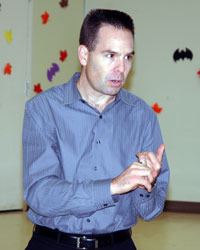MARYSVILLE — The possible coming of coal trains drew not only Marysville citizens, but also those of Tulalip, Lake Stevens, Mukilteo and Bellingham, as well as a pair of politicians, to the cafeteria of Totem Middle School on the evening of Tuesday, Oct. 30.
Marysville Mayor Jon Nehring led off the public workshop meeting’s remarks by asserting that “few other communities would be as affected as us” by the extra train traffic generated by coal cars, given the city’s 11 at-grade railroad crossings.
“If we’re getting 18 trains going back and forth in a day, then that impacts small businesses and residents looking to get to work and go about their daily lives,” Nehring said, noting that automobile traffic is already impacted in the city due to the number of roads that cross the railroad line. “It also affects public safety, for fire trucks or emergency aid of any kind, where a few minutes can make the difference between life and death.”
Nehring expressed pride in joining surrounding municipalities to lobby state elected officials for an Environmental Impact Statement for the proposed 54-million-tons-per-year coal export terminal at Cherry Point, Wash., and urged the citizens themselves to speak out on this issue, since “your comments as individuals carry so much weight with your representatives in government. We’ll do our part, but don’t underestimate the role that you play.”
Robin Everett of the Cascade Chapter of the Sierra Club underscored Nehring’s message by explaining that the process by which agencies will decide to include certain impacts in the EIS will be affected by public input, especially during the early stages.
“This initial period is our first, best opportunity to include our concerns,” Everett said. “If we don’t talk about them, they won’t exist in the final study report. This is a critical time.”
Although public comments may be submitted via postal mail, email and through the web, she touted the public hearings as providing the potential to make their points in a more striking manner.
“When 2,000 people show up to speak their mind, it can convey how overwhelming the opposition is to these coal trains,” Everett said.
Everett encouraged citizens to frame their comments to show a broader context and permanence to their concerns, in terms of potential impacts to the economy, the environment and quality of life, as well as to include relevant facts and figures.
“At the hearings, you’ll have two minutes each for spoken comments, so practice delivering your remarks in 90 seconds,” Everett said. “That way, rather than rushing through your points, you’re delivering them in a calm way. Bring emotion and eye contact to your delivery.”
During the question-and-answer session that followed her presentation, Everett refuted claims that denying the coal trains a route through Washington would simply inspire them to make a path through Canada instead.
“If [Burlington Northern Santa Fe] could ship through Canada they would, but Canada’s ports can’t take that volume,” Everett said.
Dan Matthews, the Republican challenging Democratic U.S. Rep. Rick Larsen for Washington’s 2nd congressional district, spoke up to criticize Larsen for supporting the coal trains, which Matthews deemed a risk to the ecosystem and an unfair burden to local taxpayers.
“I propose a $1-a-ton fee,” Matthews said. “We as taxpayers should not be paying for their freight. With 100 million tons a year, that adds up to $100 million a year that could be applied toward mitigation fees for railroad crossings.”
“Who’s going to be paying for their infrastructure upgrades?” Everett asked. “It’s going to be us. Our tax dollars need to go into this economy.”
The next public hearing to offer input on the EIS is Tuesday, Nov. 13, from 4-7 p.m., preceded by a rally at 3 p.m., at North Seattle Community College, located at 9600 College Way North in Seattle. For more information, contact Everett at 206-378-0114, ext. 308, or robin.everett@sierraclub.org, or log onto www.coaltrainfacts.org.



